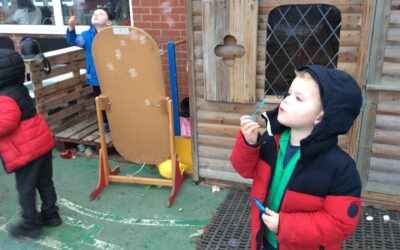Computing
Computing is not about computers any more. It is about living.
Nicholas Negroponte
Our Computing Curriculum
Intent
Computing skills are integral to everyday life and it is our intention at OLSE that we provide a curriculum where children learn how to make the most of digital opportunities and become digitally literate. They need to be able to learn, create, develop skills of computational thinking and be safe in a digital environment. Our Computing curriculum gives pupils the opportunity to develop a broad range of digital skills using a range of technology.
At OLSE, we teach a curriculum that enables children to become effective users of technology who can:
- Understand and apply the essential principles and concepts of Computer Science, including logic, algorithms and data representation;
- Analyse problems in computational term, and have repeated practical experience of writing computer programs in order to solve such problems;
- Evaluate and apply information technology analytically to solve problems;
- Communicate ideas well by utilising appliances and devices throughout all areas of the curriculum.
Implementation
Computing at OLSE is well resourced and regular training is given. It is taught in a number of ways. In the Early Years; the approach is through cross-curricular learning with an emphasis on hands on experiences and is assessed through the Understanding the World, Early Learning Goal. Teaching is through context-based and role play experiences using many resources such as I-Pads and programmable toys. From Year One upwards, we use Purple Mash as a cohesive scheme of work addressing the statutory aspects of the National Curriculum. As a school, we believe in delivering fun and engaging lessons which help to raise standards and allow all pupils to achieve to their full potential. Whilst our discrete Computing lessons use Purple Mash as a foundation for teaching, we also use technology as a tool for learning across the curriculum and build our understanding by using a range of other software. This ensures digital skills are embedded and further engage the pupils in leading their own learning. They are able to use technology imaginatively and creatively whilst also becoming efficient learners and critical thinkers. Cross-curricular teaching helps enthuse and equip children with the capability to use technology throughout their lives. We believe that this transference of skills can aid in teaching pupils the strategies and knowledge necessary to enable them to reap the benefits of the online world, whilst being able to minimise risk to themselves or others. We unsure the objectives from Education for a Connected World are taught and online safety is an integral part all lessons involving digital technology.
Impact
Progress is measured through ongoing teacher assessments. Work done through Purple Mash is saved electronically in the children’s personal document folders and progress is tracked through the Purple Mash which is monitored by the subject leader. Evidence folders using Seesaw are used to collate cross-curricular work. Discussions with pupils will show they know how to stay safe when using digital technology.
Knowledge Organisers
Autumn |
Spring |
Summer |
|||||||
Year 1 |
Online Safety |
Grouping & Sorting |
Pictograms |
Lego Builders |
Maze Explorers |
Animated Story Books |
Coding |
Spreadsheets |
Technology Outside School |
Year 2 |
Coding | Online Safety | Spreadsheets | ||||||
Year 3 |
Touch Typing | Computational Thinking & Coding | |||||||
Year 4 |
Coding | Online Safety | Spreadsheets | Writing for Different Audiences | Logo | Animation | Effective Searching | Hardware Investigators | Making Music |
Year 5 |
|||||||||
Year 6 |
|||||||||
|
|
|||||||||
Latest News
Keeping Happy
Today we marked both Safer Internet Day and Mental Health Awareness Day. Despite being break the rules day, in Reception we discussed why we have rules and why these are important. The children talked about rules they have at home when they use the internet or their...



